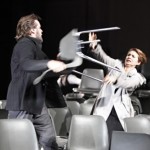By Rebecca Schmid
The Deutsche Oper’s Tischlerei, a new wing for alternative music theater, hosted the results of Neue Szenen—a competition for composition launched by the Hans Eisler Conservatory—on April 8. Three young composers, Evan Gardner, Stefan Johannes Hanke and Leah Muir, emerged from a pool of 52 applicants with their musical settings of a monologue about the Russian journalist Anna Politkowskaja, who was held hostage in 2002 while reporting about the war in Chechnya and murdered outside her Moscow apartment four years later. The topic seems slightly less hackneyed following the bombings in Boston (maybe Sarah Palin should have to sit through all three versions so that she doesn’t confuse the republic with former Czechoslovakia). Each composer was allotted five voices, a maximum of 18 instruments, and their own stage director—yielding scene changes that lasted as long as 20 minutes. It might have made sense to limit directors to a single, mutable set design; surely it wasn’t necessary to dismantle a proscenium that in fact masked acoustics in the first scene (Gardner’s Die Unterhändlerin ‘The Negotiator’) to set up a mess of chairs for Hanke’s It will be rain tonight.
Gardner took the most literal approach with a text that included three other contributors (not including the monologue’s author Christoph Nußbaumeder). A black-masked terrorist (countertenor Georg Bochow) patronized Politkowskaja (mezzo Zoe Kissa), who declared at gunpoint that she “belongs on the side of the oppressed.” The eerie textures of Gardner, an American composer who has lived in Berlin since 2006, underscored the ominous drama but threatened to grow static. It didn’t help that the Echo Ensemble, resident at the Hans Eisler Conservatory, struggled to cleanly execute advanced string techniques under the baton of Manuel Nawri. One of the most effective moments emerged when a frightened character named Masha (Katharina Thomas) panted through a megaphone against ricocheting motives. Gardner’s ensemble writing also revealed great potential.
Hanke took a more poetic approach, with atmospheric winds and more conventional but sophisticated orchestration that illustrated the emotional world of Politkowskaja. The music might have been even more moving without the pseudo-Brechtian staging (Tamara Heimbrock). Muir, another American native, working with highly subtle textures such as wilting slides and sustained, post-Feldman dissonances, suffered most from the Regie (Michael Höppner), set in a dystopically bureaucratic office (presumably that of a newspaper) where an actor, at a climactic moment with fake blood dripping down his legs, reminisces about a lost cat. All considerations aside, Neue Szenen deserves credit for affording emerging composers the opportunity to stage their works at a major venue.
Le Grand Macabre
The Komische Oper has revived Intendant Barrie Kosky’s 2003 staging of Ligeti’s Le Grand Macabre, referenced earlier this season by Robert Carsen with an apocalyptic toilet bowl in Prokofiev’s Love for Three Oranges at the Deutsche Oper. To be sure, the gesture is distasteful in both instances. Kosky uses the porcelain bowl as a throne for Nekrotzar (the Grand Macabre, or a personification of death), which overflows with excrement when he declares the end of the world; Carsen, with his tongue in cheek, has the cook of Creonte’s palace retrieve the magic oranges from his own latrine. But Kosky redeems moments of senseless vulgarity by recreating the opera’s surreal reflection upon life and death with the right blend of dark humor, eroticism and biting social criticism (as seen May 5). The sight of Nekrotzar (Claudio Otelli) chewing on organs in the opening cemetery tableau, his face smeared in fake blood, might have been too much for this viewer, but Ligeti’s musical landscape pulses with death and violence. Kosky brings the characters to life with great dramatic clarity—the gravedigger Piet (Chris Meritt) bumbles around and laughs with morbid naivety; Prince Go-Go (Andrew Watts) is a sex-obsessed, spoiled brat. The director even manages to pull off a threesome with the two ministers (Tansel Akzeybek and Carsten Sabrowski) without it seeming purely for the sake of provocation.
In an amusing touch, the police chief Gepopo (Eir Inderhaug) sticks her head out from the hot pink bed of the prince (sets and costumes by Peter Corrigan) to announce the impending arrival of Nekrotzar, armless beneath her blazer as she bounces up and down in a state of orgiastic mania. The final tableau, in which the characters are trapped somewhere between life and death, evoked so vividly with Ligeti’s shimmering, microtonal textures, emerged in mesmerizing strokes as mermen slithered onstage beneath a heavenly city that descended on a self-consciously artificial cloud. It was certainly over-the-top—and disruptive to the opera’s dramatic flow—when the prince suddenly belted out the 1980s hit The Loco-Motion from his porcelain throne after the departure of the ruffians (here a priest, a rabbi and an Imam), but with the return of the lovers Amando and Amanda (Annelie Sophie Müller, Julia Giebel), and their sensuous, interlocking intervals, Ligeti’s score came to an absorbing close. Despite intermittent gimmicks, the cast was strong throughout, both musically and dramatically, and the house orchestra delivered a fine performance under Baldur Brönimann.
